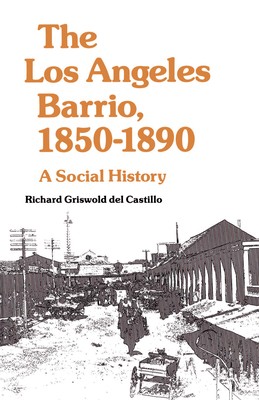
- We will send in 10–14 business days.
- Author: Richard Griswold del Castillo
- Publisher: University of California Press
- ISBN-10: 0520047737
- ISBN-13: 9780520047730
- Format: 13.7 x 21.5 x 1.8 cm, softcover
- Language: English
- SAVE -10% with code: EXTRA
Reviews
Description
"An imponant book .... [which] provides the first detailed analysis of the changes that transformed one of the most important Mexican pueblos in the Southwest into a Chicano urban barrio. Using quantitative data together with traditional secondary and primary historical sources, the author traces the major socio-economic, political, and racial factors that evolved during the post-Mexican War decades and that created a subordinate status for Mexican Americans in a burgeoning American city."--Western Historical Quarterly "Griswold del Castillo's history of the Mexican community during the first decades of the 'American era' . . . concentrates on the mechanisms which the community adopted as it was confronted by changes in the economic structure of the region, the in-migration of Anglo-Americans as well as Mexicans, and by the effects of racial segregation on the community. [The] aim is to reveal the history of a community undergoing rapid social and economic change, not to write the history of one society's domination of another."--UCLA Historical Journal "Los Angeles Chicanos emerge not as the homogeneous, passive victims of stereotypical fame, but as internally diverse, active participants in the simultaneous struggles to maintain their socio-cultural fabric and to capture a part of the American Dream. The author effectively demonstrates that the Chicano decline occurred not because of cultural weaknesses but as the almost inevitable resu lt of Anglo prejudice, numerical domination, and control of political and economic institutions. . . . an admirable book and a fine piece of scholarship.''--American Historical Review
EXTRA 10 % discount with code: EXTRA
The promotion ends in 19d.17:30:15
The discount code is valid when purchasing from 10 €. Discounts do not stack.
- Author: Richard Griswold del Castillo
- Publisher: University of California Press
- ISBN-10: 0520047737
- ISBN-13: 9780520047730
- Format: 13.7 x 21.5 x 1.8 cm, softcover
- Language: English English
"An imponant book .... [which] provides the first detailed analysis of the changes that transformed one of the most important Mexican pueblos in the Southwest into a Chicano urban barrio. Using quantitative data together with traditional secondary and primary historical sources, the author traces the major socio-economic, political, and racial factors that evolved during the post-Mexican War decades and that created a subordinate status for Mexican Americans in a burgeoning American city."--Western Historical Quarterly "Griswold del Castillo's history of the Mexican community during the first decades of the 'American era' . . . concentrates on the mechanisms which the community adopted as it was confronted by changes in the economic structure of the region, the in-migration of Anglo-Americans as well as Mexicans, and by the effects of racial segregation on the community. [The] aim is to reveal the history of a community undergoing rapid social and economic change, not to write the history of one society's domination of another."--UCLA Historical Journal "Los Angeles Chicanos emerge not as the homogeneous, passive victims of stereotypical fame, but as internally diverse, active participants in the simultaneous struggles to maintain their socio-cultural fabric and to capture a part of the American Dream. The author effectively demonstrates that the Chicano decline occurred not because of cultural weaknesses but as the almost inevitable resu lt of Anglo prejudice, numerical domination, and control of political and economic institutions. . . . an admirable book and a fine piece of scholarship.''--American Historical Review


Reviews